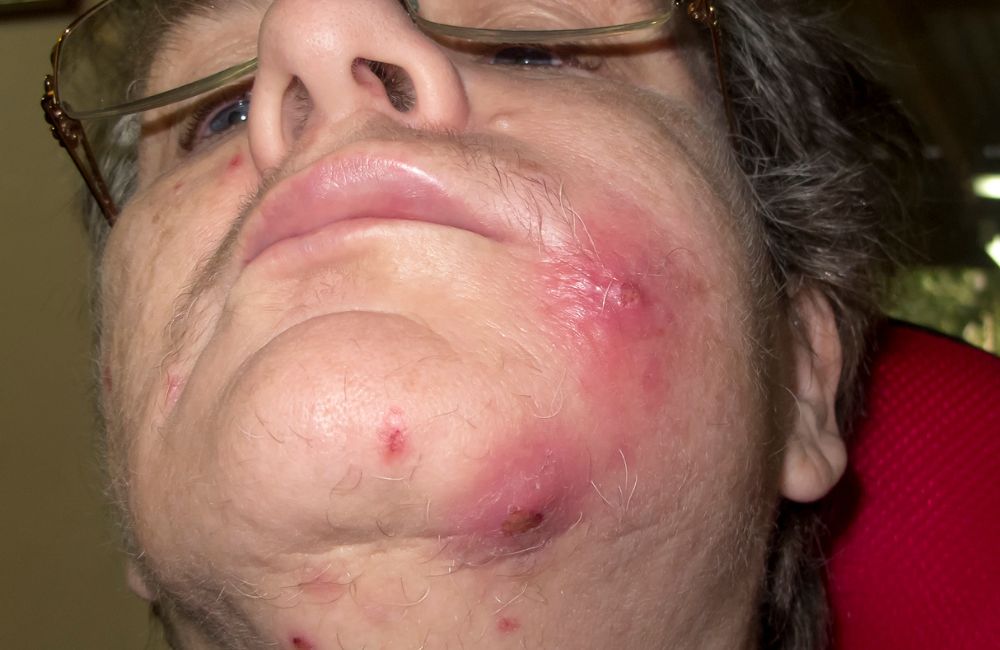
Staph infections, caused by Staphylococcus bacteria, can quickly turn from mild to severe if not promptly treated. Understanding the key symptoms that require urgent care in Bridgeport, CT, is vital for the well-being of its residents. This guide highlights seven critical signs indicating that a visit to an urgent care in Bridgeport, CT, is necessary.
What is a Staph Infection?
7 Warning Signs of Staph Infections
First Aid Measures: How to Prevent Staph Infections
How is Staph Infection Diagnosed at Your Local Urgent Care in Bridgeport, CT
Frequently Asked Questions
Key Takeaways
|

A staph infection is caused by the bacteria known as Staphylococcus, commonly known as staph. When these bacteria enter the body, they can cause an infection. While many staph infections remain localized at the site of entry, they have the potential to spread deeper, causing more severe problems such as bloodstream infections, pneumonia, or bone infections.
In 2017, the United States recorded over 119,000 cases of bloodstream staph infections, with nearly 20,000 fatalities, highlighting the severe impact and lethal potential of these bacteria. The opioid crisis further complicates this public health challenge, as nearly one in ten serious staph infections in 2016 involved individuals who inject drugs, including opioids.
Staph infections can range from simple skin infections to more severe conditions affecting the lungs, heart, blood, or bones. Some strains of these bacteria, such as Methicillin-resistant Staphylococcus aureus (MRSA), are resistant to standard antibiotics, making them more challenging to treat. Understanding the signs of a staph infection and when to seek urgent care in Bridgeport, CT, is crucial in managing the risks associated with this bacteria effectively.
Understanding how staph infections progress is crucial to effectively preventing, managing, and seeking timely urgent care in Bridgeport, CT. This proactive approach can significantly reduce the risk of complications and facilitate a quicker recovery.
If you notice any of these symptoms, it is important to seek medical attention to prevent the spread of the infection and to start appropriate treatment. For immediate care, consider visiting a nearby urgent care in Bridgeport, CT.
When staph infections are not treated promptly, the bacteria can spread rapidly, leading to severe and potentially life-threatening complications.
Staph infections can affect anyone but are more likely under certain conditions that increase exposure or susceptibility to Staphylococcus bacteria. Awareness of these risk factors is crucial for prevention, especially when immediate care options, like urgent care in Bridgeport, CT, are needed. Here are the key risk factors:
Early medical intervention ensures a comprehensive assessment and immediate start of appropriate treatment, including antibiotics, drainage of abscesses, or other necessary medical procedures. Acting promptly helps alleviate symptoms more quickly and significantly reduces the risk of the infection worsening or spreading to other parts of the body. This proactive approach can prevent potentially severe complications such as sepsis, which can be life-threatening if left untreated.
Here are seven warning signs of staph infection that may warrant immediate urgent care in Bridgeport, CT.
The skin appears noticeably redder and may feel swollen compared to surrounding areas. This typically occurs around a wound, cut, or other skin break but can appear anywhere on the body.
Redness and swelling are signs of inflammation, often indicating that an infection is present and possibly worsening. These symptoms suggest that the body is attempting to fight off invading bacteria.
Apply cold compresses to the affected area to reduce swelling and redness. Keep the area clean and monitor closely for any signs of worsening, which would necessitate medical attention.
The skin may be sensitive to touch, and pain may range from mild to severe. The area might throb or ache even without contact.
Pain indicates that the infection affects deeper layers of skin or that a significant inflammatory response is underway.
Use over-the-counter pain relievers like ibuprofen or acetaminophen to manage pain. Rest the affected area and avoid any activities that might exacerbate the pain. If pain persists or worsens, seek medical evaluation from your urgent care in Bridgeport, CT.
You may notice pus or fluid accumulation under the skin, forming an abscess. It’s often swollen and warm, presenting a visible bump or lump.
An abscess signifies a localized collection of pus caused by an infection. It requires medical intervention to drain and treat properly, reducing the risk of further infection spread.
Maintain hygiene around the affected area. Do not attempt to drain the abscess at home, as this can lead to further infection. Cover with a clean, dry bandage and consult an urgent care provider in Bridgeport, CT for proper drainage and treatment.
A fever generally starts at 100.4°F (38°C) or higher, potentially accompanied by chills or sweating.
Fever can indicate that the infection has triggered a systemic response from the immune system and may be spreading beyond the initial site.
Stay hydrated and rest. Monitor your temperature and use over-the-counter fever reducers as needed. If the fever persists or is accompanied by other severe symptoms, it is important to seek medical advice from your urgent care provider in Bridgeport, CT.
The infected area feels warmer than the surrounding skin, noticeable to the touch.
Increased warmth is another sign of inflammation and active infection, suggesting that the immune system reacts to the bacterial presence.
Monitor the area for changes in size, color, or pain. Keep the area clean and avoid applying direct heat, which can worsen inflammation. If warmth increases or spreads, consult an urgent care provider in Bridgeport, CT.
Persistent sores or ulcers on the skin that do not heal or worsen over time, possibly oozing pus or fluid.
Non-healing sores can allow bacteria to enter the bloodstream or spread to other body parts.
Clean the area gently with saline water and apply an appropriate non-prescription wound care ointment. Cover the ulcer with a sterile bandage to protect it from further infection. If sores do not improve or worsen, help from your urgent care provider in Bridgeport, CT, is needed.
General body malaise, lack of energy, or excessive tiredness, often out of proportion to usual activities.
Fatigue and malaise can be subtle signs that the body is fighting an infection, possibly indicating a more severe condition.
Ensure adequate rest and nutrition to support immune function. Stay hydrated and consider taking multivitamins to boost overall health. If fatigue is accompanied by other infection symptoms, it may be time to seek medical care to evaluate the underlying cause.

Implementing effective first aid measures is crucial in preventing staph infections, especially in urgent care in Bridgeport, CT, where exposure to bacteria can be frequent.
Staphylococcus bacteria, which cause staph infections, can be present on the skin or in the nose of even healthy individuals without causing disease. Regular handwashing helps remove these bacteria from the hands, preventing the transmission to wounds or other entry points on oneself or others.
Clean any cuts or abrasions thoroughly with an antiseptic. Then, protect them with clean, dry bandages until healed. This prevents bacteria from entering wounds and causing infections.
Do not share towels, razors, or other personal items that come into contact with skin. This reduces the risk of transmitting bacteria that may cause infections.
Stay informed about the ways infections can spread. Maintain good hygiene practices to safeguard against infection.
Understanding the process of diagnosing and treating staph infections at your local urgent care center in Bridgeport, CT, is crucial for effective care.
To accurately diagnose a staph infection, your urgent care provider in Bridgeport, CT, will:
Effective treatment for a staph infection may include:
Recognizing the signs of a staph infection and understanding when to seek help at urgent care in Bridgeport, CT, are crucial steps in handling this common yet potentially serious condition. Timely medical intervention ensures the best outcomes and prevents further health complications.
Don’t let staph infections impact your life or health. Act quickly to receive immediate evaluation and treatment at DOCS Urgent Care & Primary Care – Bridgeport. Our skilled medical team is prepared to offer fast relief and tailored care for your infection concerns. Don’t delay — prioritize your health and visit us today!



During this surge in COVID-19 cases, our primary focus is meeting the high demand for tests, and we are seeing higher than usual wait times. This means we are unable to answer most phone calls. Please know that our teams are working very hard during this time to care for as many patients as safely as possible. Please click the button below for answers to common questions. We appreciate your understanding.